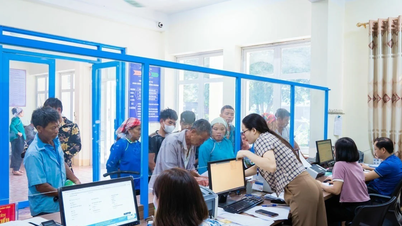Identify obstacles
Although digital transformation is taking place strongly, according to many experts, the implementation of BAĐT faces many challenges, especially at the grassroots level. According to Mr. Nguyen Ngo Quang, Director of the Department of Science, Technology and Training ( Ministry of Health ), the barriers come not only from technical infrastructure but also from the awareness of hospital leaders, the level of application of information technology (IT) among medical staff and the lack of consistency in financial mechanisms.
For medium-sized units, the implementation of BAĐT requires large investments in technical infrastructure such as software, storage devices, workstations, digital signatures and network systems, not to mention the costs of training personnel, maintaining and operating the software. Meanwhile, for financially autonomous hospitals, mobilizing resources for these items is a big challenge.
Ms. Dinh Thi Hoa, in charge of IT, Vung Tau Hospital (HCMC), said that the unit has been implementing BAĐT for many years but still faces many difficulties. The reason is that some criteria for applying IT according to Circular No. 54/2017/TT-BYT on promulgating a set of criteria for applying IT at medical examination and treatment facilities in hospitals have not been met to implement BAĐT; the dedicated server room has not met the requirements; the backup storage system and firewall equipment are not available; the wifi system covering the entire hospital is still weak...

Many hospital leaders also share this view, stating that although the medical information management system has been applied for a long time, the hospital has not yet met the standards to announce the implementation of the BAĐT file due to the lack of necessary technical and legal conditions. The hospital's IT system is old and does not have the capacity to process the increasing amount of data; the IT technical team does not meet the requirements and does not have medical experience, so it is difficult to keep up with the implementation progress.
On the other hand, many older doctors do not have the habit of reading documents on computers. At the same time, hospitals have to purchase and bid for equipment for BAĐT (especially software) to implement while there are no regulations on technical and economic norms to build prices, so determining prices is very difficult. In addition, the cost for implementing BAĐT is very large, in the context that hospitals are operating under a financial autonomy mechanism, so they will face many difficulties in terms of resources...
Learn as you go
According to Dr. Vo Ngoc Loi, Head of the General Planning Department, Ba Ria - Vung Tau Eye Hospital (HCMC), the hospital has deployed the BAĐT pilot activity since July 1 and has been implementing and drawing experience to complete it, officially operating since September 1. The unit also coordinated with telecommunications companies to deploy electronic prescriptions for patients; linked with social insurance agencies and the police to connect health examination data to electronic health records on the VNeID application...
The hospital has now achieved the basic criteria for implementing BAĐT and continues to invest and upgrade the data storage system and server system to achieve maximum efficiency.
Save 100 billion VND/year thanks to electronic medical records
Bach Mai Hospital is a special-class general hospital in the country and the first central hospital to deploy BAĐT from November 2024. Associate Professor, Doctor, Doctor Dao Xuan Co, Director of Bach Mai Hospital, said that every day the hospital receives 8,000-10,000 people for examination and treatment. With a large number of patients, without BAĐT, the cost of managing and printing medical records would be very large and complicated.
“Not printing films and not making paper medical records has helped the hospital save about 100 billion VND/year; minimize errors due to handwriting, illegible handwriting; allow quick and complete access to patient medical history information..., helping doctors make accurate and timely diagnoses and treatment regimens. This is an impressive number, showing the potential for significant cost savings when applying digitalization in healthcare,” Associate Professor, Dr. Dao Xuan Co informed.
At the City Children's Hospital (HCMC), Deputy Director Nguyen Minh Tien shared that since June 2023, the unit has deployed BAĐT and by October 2024 "abolished" paper medical records. Instead of holding medical examination books as before, patients are given QR codes to use throughout the examination process.
Not only do patients benefit, but hospitals also save a huge amount of money when using BAĐT. Previously, hospitals had to spend about 2 billion VND annually to buy paper for medical examinations. Now, with BAĐT, patient data is stored in 3 different areas and will not be lost.

BAĐT data is a valuable resource for medical research, helping to develop new and effective treatment methods. Promoting digital transformation also facilitates the application of artificial intelligence (AI), Internet of Things (IoT), etc., bringing breakthroughs in disease diagnosis and treatment. However, the number of hospitals nationwide implementing BAĐT is still small.
According to Mr. Do Truong Duy, Director of the National Center for Health Information (Ministry of Health), by the end of July 2025, only about 270 hospitals nationwide had deployed e-health records to replace paper records, accounting for about 7.5% of the total of more than 1,800 medical examination and treatment facilities (not including the network of medical stations), far below the set target.
Dr. Nguyen Tri Thuc, Deputy Minister of Health:
Must ensure quality and schedule
The implementation of the BAĐT is a key and top priority task. Heads of agencies and units must take full responsibility for this work, prioritize resources, mobilize the participation of organizations, businesses and people. Resolutely implement, ensure quality, on schedule and complete in September 2025, according to Directive No. 07/CT-TTg dated March 14, 2025 of the Prime Minister.
The implementation of BAĐT must ensure substance, bring specific effectiveness, improve productivity, quality of medical examination and treatment, disease prevention, and bring practical benefits to people and medical facilities. At the same time, ensure information security, network security and information confidentiality according to regulations.
Dr. TRAN QUY TUONG, President of Vietnam Medical Informatics Association:
Forming data usage habits
To implement BAĐT, it is important to restructure professional processes, reorganize the operating model and form data usage habits in the medical team. Along with that, the Ministry of Health should continue to pay more attention and direct more strongly the work of digital transformation of healthcare in general, and the implementation of BAĐT in particular; have sanctions for units and localities that do not implement BAĐT according to the prescribed roadmap.
Hospital leaders should clearly see the benefits and significance of implementing BAĐT, thereby really paying attention and proactively implementing BAĐT records at the hospital.
Associate Professor, Dr. TANG CHI THUONG, Director of Ho Chi Minh City Department of Health:
Review hospital leaders if implementation is slow
The Board of Directors of the Ho Chi Minh City Department of Health requires hospital directors to be aware that the deadline for implementing the BAĐT is September 2025. This is a top priority task, requiring all resources to be focused on completing it. Delays in digital transformation, especially BAĐT records, will seriously affect the performance, effectiveness and efficiency of the entire industry.
If after September 30, 2025, any hospital does not have BAĐT, the hospital leaders must conduct a review. The synchronous deployment of BAĐT in all hospitals is a key factor to effectively connect and exploit these data, towards building an electronic health record for each citizen of the city.
Source: https://www.sggp.org.vn/hoan-tat-ho-so-benh-an-dien-tu-truoc-ngay-30-9-2025-cuoc-dua-nuoc-rut-post805890.html


![[Photo] President Luong Cuong receives US Secretary of War Pete Hegseth](https://vphoto.vietnam.vn/thumb/1200x675/vietnam/resource/IMAGE/2025/11/02/1762089839868_ndo_br_1-jpg.webp)
![[Photo] Lam Dong: Images of damage after a suspected lake burst in Tuy Phong](https://vphoto.vietnam.vn/thumb/1200x675/vietnam/resource/IMAGE/2025/11/02/1762078736805_8e7f5424f473782d2162-5118-jpg.webp)





































































































Comment (0)